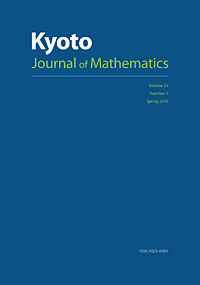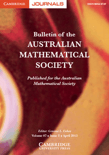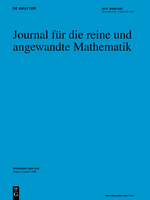
Tunisian Journal of Mathematics
Scope & Guideline
Unlocking New Dimensions in Mathematical Research.
Introduction
Aims and Scopes
- Algebraic Geometry and Topology:
The journal frequently publishes works related to algebraic structures, including Hodge theory, moduli spaces, and homological methods, reflecting a strong focus on the interplay between geometry and algebra. - Analysis and Partial Differential Equations:
A significant portion of the journal's articles delve into various analytical techniques, particularly in the study of partial differential equations, including Sobolev spaces, nonlinear Schrödinger equations, and fluid dynamics. - Representation Theory and Algebraic Structures:
Research in representation theory, particularly concerning p-adic groups and operads, is prominently featured, showcasing the journal's commitment to exploring algebraic structures in depth. - Mathematical Physics:
The journal includes papers that bridge mathematics and physics, particularly in areas such as statistical mechanics, dynamical systems, and the study of integrable systems, indicating a broad interdisciplinary approach. - Combinatorics and Probability:
The publication of works in combinatorial mathematics and probability theory, including random walks and statistical ensembles, indicates a growing interest in these areas.
Trending and Emerging
- Nonlinear Dynamics and Fluid Mechanics:
An increasing number of papers focus on nonlinear dynamics, particularly in relation to fluid mechanics, showcasing the journal's engagement with contemporary issues in applied mathematics. - Algebraic Structures in Modern Contexts:
There is a trend towards exploring algebraic structures, such as Tambara functors and operads, in modern mathematical contexts, reflecting a growing interest in higher algebra. - Geometric Analysis and Differential Geometry:
Emerging themes in geometric analysis, particularly with respect to Higgs bundles and K3 surfaces, indicate a revitalization of interest in differential geometry within the journal. - Mathematical Aspects of Statistical Physics:
The intersection of mathematics and statistical physics is increasingly represented, with papers addressing topics such as Ising systems and probabilistic models, pointing to a trend in interdisciplinary research. - Homotopy Theory and Higher Categories:
Recent works in homotopy theory and the study of higher categories demonstrate an emerging focus on foundational aspects of mathematics, signaling a shift towards more abstract and categorical approaches.
Declining or Waning
- Classical Number Theory:
There has been a noticeable decrease in papers focused on classical number theory topics, suggesting a shift towards more modern and applied areas of mathematics. - Elementary Geometry:
The frequency of publications related to elementary geometric concepts and problems has diminished, indicating that the journal may be prioritizing more complex and abstract mathematical inquiries. - Discrete Mathematics:
Although still relevant, topics in discrete mathematics, such as graph theory and combinatorial optimization, are appearing less frequently in recent issues compared to previous years. - Mathematical Education:
Research focused on pedagogical methods and mathematical education is less represented in newer volumes, suggesting a potential shift away from educational aspects in favor of pure research. - Computational Mathematics:
While computational methods remain important, there is a noticeable decline in the number of papers dedicated to numerical analysis and computational techniques, indicating a possible trend towards theoretical advancements.
Similar Journals

Kyoto Journal of Mathematics
Unleashing potential through cutting-edge mathematical research.Kyoto Journal of Mathematics is a premier academic publication dedicated to advancing the field of mathematics, published by DUKE UNIVERSITY PRESS. Established in 1996, this journal serves as a vital platform for sharing innovative research and breakthrough studies across various mathematical disciplines. The journal has consistently maintained a prestigious Q1 ranking in the category of Mathematics (miscellaneous) as of 2023, reflecting its significant impact and contribution to the mathematical community. With its Open Access policy, the Kyoto Journal of Mathematics ensures that groundbreaking research is easily accessible to a global audience, fostering collaboration and knowledge dissemination among researchers, professionals, and students alike. The journal's commitment to excellence and relevance in mathematical research is underscored by its extensive archive of published works and its continuous engagement with contemporary mathematical challenges. This makes the journal an essential resource for anyone seeking to stay abreast of current trends and advancements in the field.

Bulletin Mathematique de la Societe des Sciences Mathematiques de Roumanie
Advancing Mathematical Frontiers in RomaniaThe Bulletin Mathematique de la Societe des Sciences Mathematiques de Roumanie, published by SOC MATEMATICE ROMANIA, is a distinguished platform dedicated to the dissemination of advanced mathematical research and developments. With ISSN 1220-3874 and E-ISSN 2065-0264, this journal serves the global mathematical community, particularly in Romania, fostering collaboration and innovation in varied mathematical disciplines. Despite being categorized in the Q3 quartile of the *Mathematics (miscellaneous)* field and holding a Scopus rank placing it in the 19th percentile, the journal remains committed to publishing high-quality articles that explore theoretical and applied mathematics. Running from 2008 to 2024, it aims to encourage the sharing of knowledge and advancements within both academic and practical domains, affirming its importance as a valuable resource for researchers, professionals, and students alike. Although the journal does not currently offer open access, it contributes to the mathematical discourse through the rigorous selection of papers that adhere to high scholarly standards.

TRANSACTIONS OF THE AMERICAN MATHEMATICAL SOCIETY
Unveiling Insights in the Mathematical RealmTRANSACTIONS OF THE AMERICAN MATHEMATICAL SOCIETY, published by the American Mathematical Society, is a premier journal in the field of mathematics that has been contributing to the advancement of mathematical knowledge since 1900. With an ISSN of 0002-9947 and an E-ISSN of 1088-6850, this journal holds a prestigious position in the academic landscape, evidenced by its Q1 rankings in both Applied Mathematics and Miscellaneous Mathematics categories as of 2023. With a Scopus ranking of #97 in General Mathematics and a percentile standing of 75th, the journal is recognized for its rigorous peer-review process and the quality of the research it publishes. Though it does not currently offer open access options, it essentially serves as a vital resource for researchers, professionals, and students seeking critical insights and developments in mathematical theory and applications. The Transactions aim to publish high-quality research articles that foster the exchange and dissemination of ideas, supporting the growth of both theoretical and applied mathematics within the global scholarly community.

PUBLICATIONES MATHEMATICAE DEBRECEN
Pioneering Insights in Theoretical and Applied MathematicsPublicationes Mathematicae Debrecen is a renowned international journal published by the University of Debrecen, Institute of Mathematics, situated in Hungary. This journal, with both ISSN 0033-3883 and E-ISSN 2064-2849, has established itself in the field of mathematics since its inception, with coverage extending from 1997 to 2024. Recognized for its rigorous academic standards, it currently holds a Q3 ranking in the mathematics (miscellaneous) category for 2023 and ranks at the 42nd percentile among general mathematics journals in Scopus. Publicationes Mathematicae Debrecen aims to disseminate high-quality research across various areas of mathematics, contributing to the advancement of knowledge and practice in this dynamic field. Although it is not an open-access journal, its readers can access a wealth of scholarly work that addresses both theoretical and applied mathematical issues, making it an invaluable resource for researchers, professionals, and students alike.

BULLETIN OF THE AUSTRALIAN MATHEMATICAL SOCIETY
Connecting Researchers and Ideas in the World of MathematicsBULLETIN OF THE AUSTRALIAN MATHEMATICAL SOCIETY is an esteemed journal dedicated to advancing the field of mathematics, published by Cambridge University Press. Since its inception in 1969, this periodical has fostered scholarly communication and showcased pivotal research in various domains of mathematics, now projected to continue until 2024. With an impact factor that places it in the Q2 category of miscellaneous mathematics research, it holds a notable position among its peers, ranking 215th out of 399 in the Scopus database. Though it does not currently offer open access options, the journal remains a vital resource for researchers, professionals, and students seeking to deepen their understanding of mathematical advancements. The Bulletin serves as a crucial platform for disseminating original research, comprehensive reviews, and insightful perspectives that navigate the complexities of mathematics today, ensuring the community is well-informed and engaged.

Research in the Mathematical Sciences
Pioneering Research for Tomorrow's MathematiciansResearch in the Mathematical Sciences is a prestigious journal published by Springer International Publishing AG, specializing in a diverse range of mathematical disciplines. With an ISSN of 2522-0144 and an E-ISSN of 2197-9847, this journal operates out of Switzerland and has established a reputation for excellence in research dissemination since its inception in 2014. The journal is currently ranked in the highly regarded Q2 quartile for Applied Mathematics, Computational Mathematics, and Mathematics (miscellaneous), along with a Q3 rank in Theoretical Computer Science, reflecting its substantial influence within the academic community. Researchers will find great value in this journal as it features high-quality, peer-reviewed articles that contribute to the advancement of mathematical sciences. The journal promotes open access options, facilitating greater accessibility to innovative research findings. With its comprehensive scope and strong Scopus rankings, Research in the Mathematical Sciences serves as an essential resource for academics, professionals, and students eager to stay at the forefront of mathematical research and its applications.

ANNALS OF MATHEMATICS
Pioneering Research in the Heart of MathematicsANNALS OF MATHEMATICS is a prestigious peer-reviewed journal published by the Department of Mathematics at Princeton University, dedicated to the advancement of mathematical research across diverse fields, including mathematics, statistics, and probability. With an impressive impact factor reflecting its critical role in the academic community, this journal is categorized within the Q1 quartile rankings for both Mathematics and Statistics in 2023, evidencing its high circulation of influential and often-cited publications. Researchers can access the latest findings and theoretical advancements in an environment that fosters intellectual discourse and innovation, although the journal does not currently offer open access. Spanning a remarkable convergence period from 1996 to 2024, the ANNALS OF MATHEMATICS serves as a vital resource for mathematicians, statisticians, and analysts striving to push the boundaries of knowledge and application in these critical fields.

JOURNAL FUR DIE REINE UND ANGEWANDTE MATHEMATIK
Cultivating Excellence in Mathematics ResearchJOURNAL FUR DIE REINE UND ANGEWANDTE MATHEMATIK is a prestigious publication in the field of mathematics, established in 1826 and proudly published by WALTER DE GRUYTER GMBH, a respected name in academic publishing. Renowned for its rigorous peer-review process, this journal focuses on both pure and applied mathematics, making significant contributions to various mathematical domains. With an impressive impact factor positioning it in the Q1 quartile for both applied mathematics and miscellaneous mathematics categories, the journal ranks 83rd out of 399 in General Mathematics and 282nd out of 635 in Applied Mathematics according to Scopus. The journal does not currently offer open access options but is widely available through institutional subscriptions. Its rich history and ongoing commitment to excellence position the JOURNAL FUR DIE REINE UND ANGEWANDTE MATHEMATIK as an essential resource for researchers, professionals, and students aiming to stay abreast of the latest developments in mathematical theory and practice.

Periodica Mathematica Hungarica
Connecting Researchers to the Heart of Mathematical Inquiry.Periodica Mathematica Hungarica is a prestigious academic journal published by Springer, focusing on the field of mathematics, with a particular emphasis on miscellaneous mathematical studies. Established in 1971, this journal has maintained its commitment to advancing mathematical research and its applications, making significant contributions over its converged years through 2024. With a Q2 ranking in the mathematics category as of 2023, it establishes itself as a vital resource within the mathematical community. Researchers and academics will find its inclusion in the Scopus database, ranking #189 out of 399 in general mathematics, indicative of its impact and relevance. Although it does not feature open access, the journal provides a wealth of high-quality peer-reviewed articles, thereby serving as an essential platform for the dissemination of innovative mathematical theories, methodologies, and findings. Engaging with the content of Periodica Mathematica Hungarica is crucial for anyone looking to stay at the forefront of mathematical research and development.

Forum of Mathematics Pi
Fostering Collaboration in Cutting-edge ResearchForum of Mathematics Pi, published by Cambridge University Press, stands at the forefront of mathematical research, providing an open-access platform since 2013. With an ISSN of 2050-5086, this journal has rapidly established itself within the mathematical community, particularly noted for its high impact in the realms of Algebra and Number Theory, Analysis, Discrete Mathematics and Combinatorics, Geometry and Topology, Mathematical Physics, and Statistics and Probability, as evidenced by its 2023 Q1 rankings across these categories. Its placement within the top quartile signifies its importance and influence, attracting submissions from leading researchers and academicians around the globe. The journal’s diverse scope and rigorous peer-review process ensure a high standard of scholarly excellence, making it an indispensable resource for professionals, students, and researchers eager to stay informed about cutting-edge mathematical advancements. Access to its comprehensive array of articles is openly available, promoting a culture of collaboration and knowledge sharing in the mathematics community.